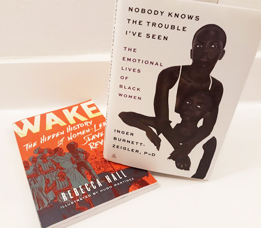c.2021, Amistad
$24.99 / $31.00 Canada
257 pages
Wake: The Hidden History of Women-Led Slave Revolts by Rebecca Hall, illustrated by Hugo Martinez
c.2021, Simon & Schuster
$29.99 / $39.99 Canada
208 pages
By Terri Schlichenmeyer
The Truth Contributor
Like almost everybody in the world, you have scars.
There’s the one you got when you were five years old, and you fell off the slide at school. The one you got when you dropped a glass and accidentally cut yourself. You have scars from fun, children, hobbies, work, and from you-can’t-remember-where. Those are the scars you wear on your outside. So how about a couple books that deal with your scars inside…?
You are beautiful. Everyone knows it, but there’s so much more to you than what can be seen. In Nobody Knows the Trouble I’ve Seen: The Emotional Lives of Black Women by Inger Burnett-Zeigler, PhD, you’ll learn how detrimental it can be to ignore your feelings, whether now or the ones from the past.
So much has been said about the strength of Black women, and while there’s no denying that Black women are steely-strong, Burnett-Zeigler points out that much of that strength and power is tied to violence, racism, sexism, poverty, and trauma, whether personal, societal, or historical. These matters can lead to Post-Traumatic Stress Disorder (PTSD), depression, and other mental health issues, but those things aren’t often explored or discussed in deeper terms. The danger is that ignoring them or tamping them down can lead to physical disorders and disease over the long-term, an overall problem that’s gone unaddressed for too long.
In bringing this subject to the forefront, and by sharing relevant stories of women who’ve recognized past issues and have dealt with them, Burnett-Zeigler helps readers to understand what must be done and why it can’t wait. Specifically, she offers permission and encouragement for readers who wish to seek professional help by removing perceived shame in it, and she advocates embracing self-care and the allowance of vulnerability.
This is a wonderful book, it’s relatable, and it’s easy to enjoy, even for the busiest of readers who need to learn to slow down and look out for themselves.
Of course, these are attitudes and practices you want to pass on to the next generation, perhaps starting with discussion and Wake: The Hidden History of Women-Led Slave Revolts by Rebecca Hall, illustrated by Hugo Martinez. Part memoir, part history, this book tells of Hall’s search to correct a long-held mythology that’s lingered throughout history.
Most stories about slavery would have you believe that men were the catalysts for revolt but Hall, the granddaughter of slaves, learned otherwise. Through documents, letters, and even physical evidence from graves, she learned that Black women were also fierce leaders of many uprisings throughout history and that women who make good trouble are just as active today as they were 200 years ago. For a 12-to-16-year-old, this is a great conversation-starter about the past, the present, and their future mental health.
If these books don’t quite fit what you’re looking for, or if you need more on these subjects, be sure to ask your favorite bookseller or librarian. They’ll know what you need and they’ll help you find it with a minimum of pain.

